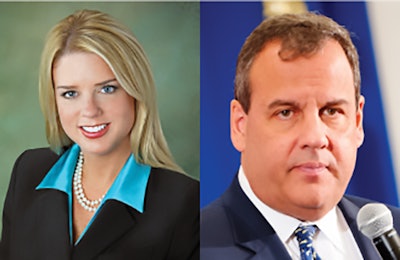
Following the resignation of U.S. Attorney General Jeff Sessions (at President Trump’s request), speculation has turned toward the nomination of a successor. Sessions’ chief of staff, Matthew Whitaker, is presently serving as acting attorney general. Today, news outlets are reporting that Trump has floated former New Jersey Gov. Chris Christie and Florida Attorney General Pam Bondi as possible candidates.
Christie and Bondi both spoke at the Republican National Convention in 2016, when Trump formally accepted the nomination for president. Christie was heavily involved as a campaign adviser during Trump’s march to the RNC.
While the abrupt reshuffling at the U.S. Department of Justice isn’t explicitly tied to Sessions’ or other potential nominees’ cannabis policies, any incoming attorney general would certainly be in a position to place his or her thumb on the scale of reform in this country.
Here, we take a look at how Christie and Bondi have engaged the question of cannabis reform in their respective states—and what that might mean amid a growing wave of legalization across the country.
Opposition to Cannabis Reform
Christie served as New Jersey’s governor from 2010-2018 and was adamantly opposed to cannabis legalization in the state.
In November 2016, he told a caller on New Jersey 101.5’s “Ask The Governor” program that any revenues raised through taxing recreational marijuana in the state would be “blood money,” according to a New Jersey 101.5 report.
"There is nothing we spend in government that is important enough to allow me to willfully poison our children for that money," he said. "That’s blood money."
The program also saw Christie reaffirm his belief that cannabis is a gateway drug. “I have watched too many kids start their addiction with alcohol and marijuana and then move on to much more serious drugs,” he said. “Every study shows that marijuana is a gateway drug and every study shows that marijuana causes damage.”
In a May 2017 press conference on substance abuse hosted by the New Jersey Hospital Association in Princeton, Christie called cannabis advocates “crazy liberals” who are willing to “poison our kids” for tax revenue, according to a Politico report.
“They want that blood money? Let them do it,” Christie said, suggesting the state’s next governor would make legalization a priority. “And they will. Let me tell you something—this will be like priority number one come January. I guarantee you, if we have a Democratic governor, it will be priority number one.”
Meanwhile, in Florida...
Bondi has served as attorney general of Florida since 2011. (She was term-limited this year and unable to run for reelection in the Nov. 6 midterms.) During her tenure, the state approved a low-THC medical marijuana law (in 2014) and then a broader medical marijuana law (2016). There have been plenty of complications and political arguments over the nature of the 2016 law’s implementation, however, and Bondi has represented the state’s interests in defending the status quo.
In August 2018, for instance, she filed a brief in support of the state’s ban on “smokable” cannabis. In challenging a circuit court judge’s ruling that the ban was unconstitutional, Bondi argued that the legislature had never intended to allow patients to smoke cannabis flower. As Orlando Weekly reported, Bondi wrote: “Time and again during debate, elected members of Florida’s Legislature emphasized that the amendment is exclusively about medicine, and that smoking is antithetical to good medicine. In considering these health-related factors, the Legislature reasonably determined that the harms caused by smoking – including harms to patients and those exposed to secondhand smoke – were ample reason to exclude smoking from the statutory definition of 'medical use.' The Legislature therefore acted under its general authority to regulate public health, safety, and welfare when it drew a reasonable line between the smoking of medical marijuana, and other delivery methods."
Last year, when Trump was mentioning Bondi’s name in connection with an appointment as director of National Drug Control Policy, WBOB in Florida pointed out that she had not overtly opposed the 2016 Florida Medical Marijuana Legalization Amendment (as she had done in the case of previous ballot initiative attempts). Rather, WBOB argued, Bondi has tended in the case of cannabis to follow public opinion trends (like votes). “As committed as she's been to taking down Florida's pill mills and cracking down on the illegal use of prescription drugs generally,” Nancy Smith wrote for the station, “Bondi is not so ideologically committed to keeping marijuana illegal that she won’t stand down in the face of overwhelming public opposition to her position.”
How that stance might jibe with the Trump administration’s Marijuana Policy Coordination Committee, of course, remains unclear.
Top photos courtesy of Wikimedia


























